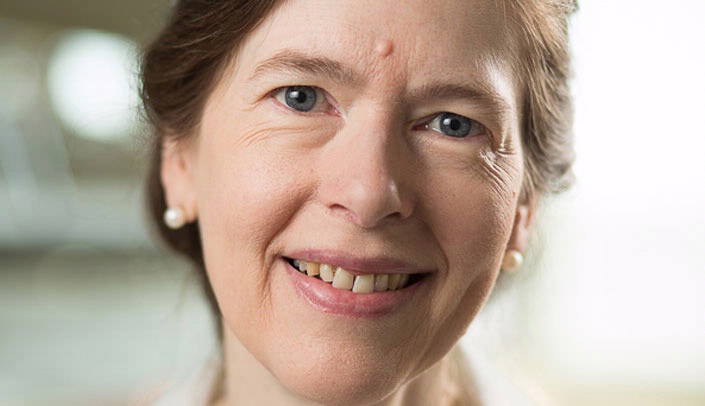For seven weeks in 2014, Jennifer Black, Ph.D., was all about grant-writing. Seven hundred pages later, Dr. Black, the Eppley Institute and UNMC had been awarded a renewal of their longstanding National Cancer Institute “Cancer Biology Training Program” T32 Grant — an award to support the nation’s best graduate students in the field of cancer research.
Students supported
Students currently supported by the training grant include:
- Beth Clymer (Cancer Research Graduate Program, advisor Robert Lewis, Ph.D.)
- Eric Cruz (Biochemistry and Molecular Biology, advisor Surinder Batra, Ph.D.)
- Luke Cypher (Cancer Research Graduate Program, advisor Hamid Band, M.D., Ph.D.)
- Brandon Griess (Biochemistry and Molecular Biology, advisor Melissa Teoh-Fitzgerald, Ph.D.)
- Staci Peters (Genetics, Cell Biology and Anatomy, advisor Rene Opavsky, Ph.D.)
- Kristin Wipfler (Genetics, Cell Biology and Anatomy, advisor Babu Guda, Ph.D.)
The Cancer Biology Training Program Grant is only open to students who are United States citizens. But Dele Davies, M.D., vice chancellor for academic affairs, has established the Dean for Graduate Studies Stipend, a fellowship associated with the Cancer Biology Training Grant that is open to outstanding international students. The current recipient is:
- Alice Hsu (Cancer Research Graduate Program, advisor Jennifer Black, Ph.D.)
UNMC has received the competitive NIH-funded T32 grant since 1988, with Angie Rizzino, Ph.D., of the Eppley Institute serving as program director for seven years before Dr. Black took over in 2012.
The five-year, $1.2 million grant will support six graduate students each year, with the maximum length of support for an individual student of three years. Graduate students are moved into the program as slots become available.
“It’s an award that the NCI gives to support the cream of the crop,” said Dr. Black, who oversees the program.
Participating in the grant is prestigious for the graduate students. “It’s a feather in your cap, it’s something you can put on your CV, and it is helpful in one’s career because of the association with the NIH, and it’s competitive and for highly qualified students.”
That’s important, because part of the grant application calls for institutions to show that the Ph.D. candidates supported by the grant in the past went on to success.
“So the training record is a very big deal,” Dr. Black said.
“Where it really helps the students is when they go on to get a postdoc or when they apply for postdoctoral fellowships or career development awards from the NIH (F32 and K awards),” Dr. Black said.
At the time of submission of the renewal application, UNMC’s training grant was the only cancer biology-focused T32 supported by the NCI within a nine-state region, including Montana, Wyoming, North Dakota, South Dakota, Nebraska, Kansas, Oklahoma, Missouri, and Arkansas.
At UNMC, the grant serves as a kind of umbrella program, with students and mentors from several departments and divisions taking part.
“As long as they are doing cancer research, they can be from a number of graduate programs,” Dr. Black said. “We have faculty on the training grant from many programs, including Biochemistry and Molecular Biology (BMB), Genetics, Cell Biology and Anatomy (GCBA) and Pathology and Microbiology.”
The grant also serves as a spur for UNMC’s graduate programs to remain relevant and for its curriculum to keep pace with the latest developments and emerging trends in cancer research.
“We have to make sure that our courses and curriculum remain state-of-the-art,” Dr. Black said. “For example, the NIH really wants students to be exposed and get training in bioinformatics and biostatistics — those were classes that were already available, but we made them requirements. We also just added a brand new course called ‘Intensive Training in Translational Cancer Research,’ which is going to expose students to the clinical side, while highlighting ‘bench-to-bedside and beyond’ approaches that integrate basic and patient-oriented research.”
“We will give students the opportunity to learn about the rapid autopsy program that we have here (established by Tony Hollingsworth, Ph.D., 12 years ago), to observe doctor-patient interactions and medical procedures, visit the operating room, and experience the activities in the frozen section room first-hand. We’ll have a series of very translation-oriented lectures, as well,” Dr. Black said.
More than 30 UNMC faculty participate in the grant, working with Ph.D. candidates.
“Every faculty member on the training grant has to be funded and have a track record of funding, and also a very strong record of training of students,” Dr. Black said.
The faculty on these grants are evaluated on how many students they have graduated, and also on the quality of the publications that have resulted from those students’ work in their labs.
“So you want to have really strong faculty who have both a track record of excellent science and also a track record of excellent training.”
Dr. Black is already looking ahead to the next training grant application, due in five years. (She thanked her “wonderful” assistant, Kelly Jordan, for helping her get this one in.)
“There’s a lot that goes into a training grant,” she said.” The NCI wants to see programs that are state-of-the-art, so every time you put in a renewal, there have to be new classes and new initiatives to keep it vibrant. You actually have to start thinking now, ‘What am I going to do five years from now to make it different and unique?'”
